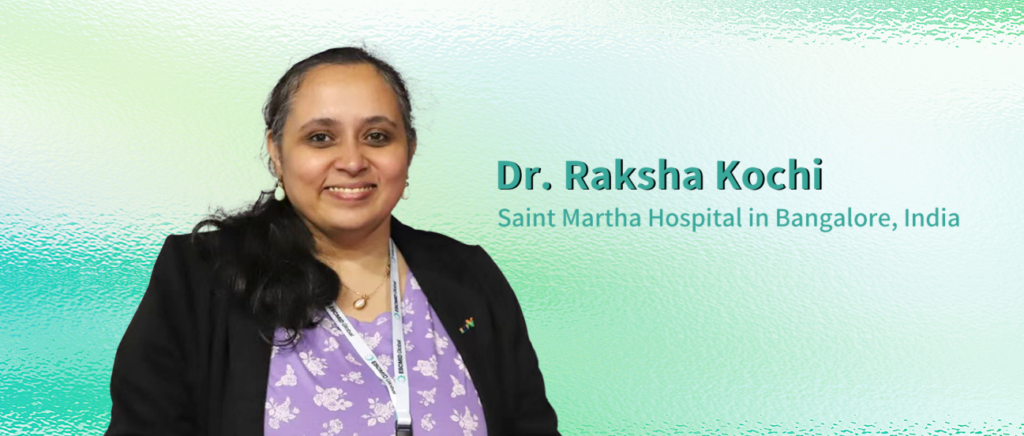
Editor’s Note: Traditional microbiology laboratory methods such as Gram staining and antimicrobial susceptibility testing still rely on manual interpretation of results and report generation. The introduction of artificial intelligence (AI) holds the potential to further enhance the efficiency and accuracy of microbiological testing. At the recent ESCMID Global 2024 summit, Dr. Raksha Kochi, Director of Clinical Microbiology Laboratory at Saint Martha Hospital in Bangalore, India, presented a study on the use of ChatGPT for analyzing Gram stain results, demonstrating its positive application potential.
Research Overview
Collision of Old and New: Validating the Clinical Utility of ChatGPT in Facilitating Interpretation of Gram Stain Results
Background
With advances in medical technology, there is great potential for automation in clinical practice. In microbial diagnostics, rapid and reliable clinical interpretation, particularly of Gram stain reports, is crucial. While advanced language models like ChatGPT have the potential to simplify this process, their validation in clinical practice is essential. This study aimed to validate ChatGPT as an effective tool for clinically interpreting Gram stain reports. Objectives included assessing ChatGPT’s accuracy and speed in delivering interpretations and evaluating its potential impact on clinical decision-making.
Methods
Over a one-year period from July 2022 to June 2023, researchers collected a large dataset of 7,238 sputum samples from a tertiary hospital. ChatGPT was trained to generate concise clinical interpretations based on conceptual maps of these reports. Two independent clinical experts reviewed and validated these interpretations. Assessment was conducted on accuracy, processing time, and potential for improving clinical workflows.
Results
Among 3,764 samples with detected microorganisms, the microbial distribution was as follows: Mycobacterium catarrhalis (32%), Streptococcus pneumoniae (17%), Haemophilus influenzae (11%), Klebsiella pneumoniae (6%), Acinetobacter baumannii complex (7%), Staphylococcus aureus (2%), Group A Streptococcus (1%), Corynebacterium diphtheriae (0.5%), mixed anaerobes (6%), Candida spp. (6.5%), Aspergillus spp. (7%), and Mucor spp. (2%). Notably, among all 7,238 samples, 35% were identified by ChatGPT as normal (no microbial detection), 52% could identify pathogens, and an additional 13% showed saliva contamination, suggesting recommendations for repeat sampling. ChatGPT consistently provided accurate clinical interpretations in 68% of Gram stain report cases, demonstrating its potential to expedite the interpretation process in clinical settings. The AI tool effectively shortened clinical assessment time, aiding in provisional diagnosis, especially in resource-limited situations, and enhancing the utility of traditional Gram staining.
Conclusion
This study highlights the potential of ChatGPT in medicine, particularly in expediting the interpretation of Gram stain reports. Benefits include accelerated clinical decision-making and improved resource efficiency. Nevertheless, human supervision remains crucial to ensure the accuracy and clinical relevance of AI-generated interpretations. The successful validation of ChatGPT in this study underscores the ongoing need for research and development in healthcare automation and AI-assisted diagnostics.
Researcher’s Insights
Infectious Disease Frontier: Welcome, Dr. Kochi, and thank you for agreeing to this interview. Could you please introduce yourself and tell us about your research focus?
Dr. Kochi: Hello, thank you for inviting me. I am the head of the laboratory and also serve as the infection control officer at Saint Martha’s Hospital. My research has primarily focused on exploring how artificial intelligence, especially large language models, can support and enhance the field of clinical microbiology, aiming to improve the diagnostic accuracy and operational efficiency of laboratories.
Infectious Disease Frontier: You recently attracted widespread attention with your research on the application of ChatGPT in clinically interpreting Gram stain reports. Could you summarize the main findings of this study?
Dr. Kochi: Certainly. Our study involved an extensive analysis of approximately 7,000 sputum sample Gram stains over the course of a year. We aimed to determine whether ChatGPT could improve the reporting process in our microbiology lab. The study utilized a qualitative assessment framework to evaluate the accuracy, clinical relevance, and comprehensiveness of ChatGPT’s responses. Our findings indicated that while ChatGPT is not perfect, it does provide substantial assistance, particularly in environments where there is a shortage of trained personnel. By improving how we pose queries to ChatGPT—focusing on comprehensive interpretation rather than simple pathogen identification—we were able to generate more detailed and clinically valuable reports.
Infectious Disease Frontier: In what ways is ChatGPT especially beneficial in settings with limited resources?
Dr. Kochi: Resource-limited environments often face challenges such as high sample volumes and the need for rapid analysis, which can overwhelm available staff. Traditional methods typically yield basic data, such as cell and pathogen type, but lack deeper interpretative insights that could inform subsequent clinical decisions. ChatGPT and similar AI technologies can fill this gap by enhancing the depth and breadth of report interpretations. This capability is crucial for timely and effective patient care, making AI an invaluable tool in contexts where extensive trained personnel might not be available.
Infectious Disease Frontier: What are your plans for further research in this area? How do you envision the future role of AI in medicine?
Dr. Kochi: Looking ahead, we plan to expand the application of artificial intelligence to generate more comprehensive diagnostic reports that integrate various laboratory parameters, such as those from hematology and biochemistry. Our aim is to adopt an approach to patient care that aligns with the principles of precision medicine. By improving the interpretative aspects of diagnostic reports across different medical specialties, AI can play a pivotal role in refining patient-centered care models. I firmly believe that AI will continue to expand its influence in medicine, enhancing diagnostic processes and fostering a more integrated approach to healthcare.
Infectious Disease Frontier: Thank you, Dr. Kochi, for sharing your insights. It seems that AI holds great promise for transforming healthcare practices.
Dr. Kochi: Indeed, and thank you for the opportunity to discuss our work. It is exhilarating to be at the forefront of this evolving interface between technology and healthcare. I am eager to see how AI will further reshape our capabilities and improve outcomes in the medical field.


